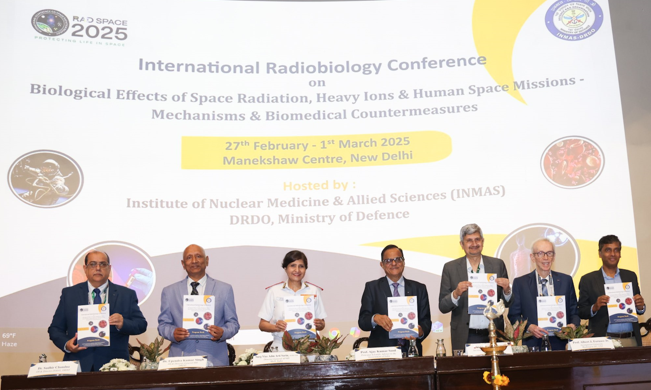New Delhi: Institute of Nuclear Medicine & Allied Sciences (INMAS), the Delhi based laboratory of Defence Research and Development Organisation (DRDO), is hosting the International Radio Biology Conference on Biological Effects of Space Radiation, Heavy Ions and Human Space missions – Mechanisms & Biomedical Counter measures at the Manekshaw Centre, Delhi for three days from February 27, Prof Ajay Kumar Sood, Principal Scientific Adviser to the Government of India, who was the Chief Guest, inaugurated the conference. Dr Samir V. Kamat, Secretary, Department of Defence R&D and Chairman, DRDO was the Guests of Honour.
Prof Ajay Kumar Sood in his inaugural address complimented INMAS for organising the event and said that one of the most significant challenges that in space exploration is the issue of space radiation, which poses a considerable risk to the health and well-being of astronauts during long duration space flights. He appreciated the efforts being made by INMAS in addressing these challenges.
Secretary DDR&D and Chairman DRDO in his address said the challenges associated with space radiation require an integrated approach, combining the expertise of various scientific disciplines. The conference, he said, serves as a unique and important forum for the exchange of knowledge between radiobiologists, physicists, engineers, and medical researchers, among others. It is through such interdisciplinary collaboration that we can develop the innovative technologies and solutions necessary to safeguard the health and well-being of astronauts in the harsh conditions of space, he added.
Dr Samir V. Kamat said that exploring the Outer Space for the benefit of mankind has become a major necessity in modern times. Significant strides have been made, such as long-term human presence on the International Space Station (ISS) and missions to the Moon, which demonstrate our growing ability to sustain life in space. By developing effective strategies and protective measures, the country would be able to ensure the safety and well-being of astronauts, paving the way for successful long-term missions to Mars and beyond.
The three day conference will deliberate upon the topics in line with its theme “Biological Effects of Space Radiation” through theme areas namely, Biomarkers of Exposure/ Susceptibility, Chronic Effects/Carcinogenesis, Combined Stressors (Microgravity, Confinement, Circadian Misalignment, Isolation and Space Radiation), Acute & Late/ Chronic Effects of Heavy Ions, Mathematical Modelling and Simulation, Medical Countermeasures, Cellular & Molecular Mechanisms, Muscle & Bone Loss, Degenerative Diseases/ Cognition, Heavy Ions Radiation Chemistry.



